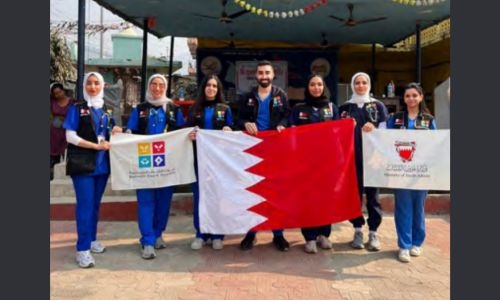A medical team supported by the Ministry of Youth Affairs and the Bahrain Youth Hostels Association recently returned from Nepal after providing critical healthcare services to over 500 citizens in remote villages. Led by Dr. Hassan Al-Mousawi, the team included medical professionals such as Dr. Aisha Al-Maqhawi and Dr. Janan Ibrahim, as well as volunteers from the Sahabat Amal team. They established a field medical camp, offering diagnosing ailments, providing medications, conducting preventive screenings, and delivering personalized health advice with the help of translators.
The team also focused on oral and dental health, offering examinations and treatment plans to the local residents. Educational efforts were made to address smoking and alcohol risks among adolescents and community members through the distribution of Nepali-language leaflets. Additionally, medical support was extended to three schools where clinics were set up, and CPR workshops were conducted for teachers and students. Emphasizing personal hygiene and environmental cleanliness, the mission highlighted the importance of proper waste disposal to enhance community health and well-being.
The medical team’s efforts were supported by the Ministry of Youth Affairs and the Bahrain Youth Hostels Association, showcasing a collaboration that prioritizes healthcare initiatives in underserved communities. Through their work in Nepal, the team not only provided essential medical services but also raised awareness about health issues and promoted hygiene practices among the local population. By offering services in oral and dental health, the team addressed specific healthcare needs while also focusing on preventive measures to improve overall well-being.
The field medical camp established by the team in remote Nepalese villages enabled them to reach a significant number of citizens who may otherwise have limited access to healthcare services. By providing medications, conducting screenings, and offering personalized health advice, the team played a crucial role in improving the health outcomes of the communities they served. The presence of translators facilitated effective communication and ensured that the medical interventions were tailored to the specific needs of the individuals seeking care.
In addition to medical services, the team also conducted educational workshops and distributed informational materials to raise awareness about smoking, alcohol risks, personal hygiene, and environmental cleanliness. By engaging with schools and community members, the team not only provided healthcare support but also empowered individuals to take charge of their own well-being. The emphasis on proper waste disposal further underscored the team’s commitment to promoting a healthy and sustainable living environment for the communities in Nepal.
Overall, the successful mission of the medical team in Nepal exemplifies the positive impact of collaborative healthcare initiatives supported by government agencies and non-profit organizations. By combining medical expertise with educational outreach and community engagement, the team was able to deliver comprehensive healthcare services to underserved populations. Through their efforts in addressing specific health concerns and promoting preventive measures, the team contributed to enhancing the overall health and well-being of the communities they served in Nepal.











